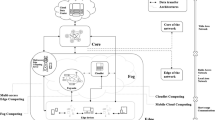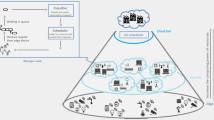Abstract
Compared with cloud computing, edge–cloud collaboration can avoid long transmitting delay to cloud since tasks are close to edge, which makes edge–cloud collaboration suitable for delay-sensitive applications. However, the complex environment of edge–cloud poses new challenge to task scheduling. A Collaborative Scheduling strategy based on task Admission and Delay Evaluation (CSADE) is proposed to deal with the challenge and ensure the quality of service (QoS). In order to schedule maximum tasks to edge and guarantee QoS, a new dynamic delay model in resource manager is proposed to accurately estimate the average delay. Based on the average delay and execution time, task evaluator prevents the impossible tasks to avoid waste of resources on both edge and cloud. The scheduling policy in task scheduler fully leverages the conditions of edge, cloud and tasks to guarantee the QoS. The fault-tolerant mechanism would launch and adjust the scheduling strategy when task Scheduling in emergencies and resource node failures. Thus CSADE ensures the QoS for delay-sensitive applications from three levels, i.e., the accurate quantitative system delay in resource manager, the strict task admission evaluation in task evaluator, the edge-first elastic scheduling strategy and the fault-tolerant mechanism in task scheduler. Comparative experimental results on simulated datasets and real datasets verify that CSADE can reduce average delay time and QoS violation rate obviously.

















Similar content being viewed by others
References
Guim, F., Metsch, T., Moustafa, H., et al.: Autonomous lifecycle management for resource-efficient workload orchestration for green edge computing. IEEE Trans. Green Commun. Netw. 6(1), 571–582 (2022)
Ghosh, A.M., Grolinger, K.: Edge–cloud computing for internet of things data analytics: embedding intelligence in the edge with deep learning. IEEE Trans. Industr. Inf. 17(3), 2191–2200 (2021)
Han, F., Zheng, M., Ling, Q.: An improved multiobjective particle swarm optimization algorithm based on tripartite competition mechanism. Appl. Intell. 52, 5784–5816 (2022)
Li, H., Ota, K., Dong, M.: Learning IoT in edge: deep learning for the internet of things with edge computing. IEEE Netw. 32(1), 96–101 (2018)
Arabnejad, V., Bubendorfer, K., Ng, B.: Budget and deadline aware e-science workflow scheduling in clouds. IEEE Trans. Parallel Distrib. Syst. 30(1), 29–44 (2019)
Li, X., Qian, L., Ruiz, R.: Cloud workflow scheduling with deadlines and time slot availability. IEEE Trans. Serv. Comput. 11(2), 329–340 (2018)
Chen, H., Wen, J., Pedrycz, W., Wu, G.: Big data processing workflows oriented real-time scheduling algorithm using task-duplication in geo-distributed clouds. IEEE Trans. Big Data 6(1), 131–144 (2020)
Chen, C.H., Lin, J.W., Kuo, S.Y.: Mapreduce scheduling for deadline-constrained jobs in heterogeneous cloud computing systems. IEEE Trans. Cloud Comput. 6(1), 127–140 (2018)
Khabbaz, M., Assi, C.M.: Modelling and analysis of a novel deadline-aware scheduling scheme for cloud computing data centers. IEEE Trans. Cloud Comput. 6(1), 141–155 (2018)
Rahman, M., Li, X., Palit, H.: Modeling and analyzing dynamic fault-tolerant strategy for deadline constrained task scheduling in cloud computing. IEEE Trans. Syst. Man Cybern. Syst. 50(4), 1260–1274 (2020)
Reshmi, R., Saravanan, D.: Load prediction using (dog-alms) for resource allocation based on IFP soft computing approach in cloud computing. Soft. Comput. 24, 15307–15315 (2020)
Chen, Y., Zhang, Y., Xia, H., et al.: A hybrid tensor factorization approach for QoS prediction in time-aware mobile edge computing. Appl. Intell. 52, 8056–8072 (2022)
Hu, B., Cao, Z., Zhou, M.C.: Scheduling real-time parallel applications in cloud to minimize energy consumption. IEEE Trans. Cloud Comput. 11, 1–1 (2019)
Arisdakessian, S., Wahab, O.A., Mourad, A., Otrok, H., Kara, N.: Fogmatch: an intelligent multi-criteria IoT-FOG scheduling approach using game theory. IEEE/ACM Trans. Netw. 28(4), 1779–1789 (2020)
Abdel-Basset, M., et al.: Energy-aware marine predators algorithm for task scheduling in IoT-based fog computing applications. IEEE Trans. Industr. Inf. 6, 1–17 (2020)
Li, X., et al.: A hybrid computing solution and resource scheduling strategy for edge computing in smart manufacturing. IEEE Trans. Industr. Inf. 15(7), 4225–4234 (2019)
Meng, J., Tan, H., Li, X.Y., Han, Z., Li, B.: Online deadline-aware task dispatching and scheduling in edge computing. IEEE Trans. Parallel Distrib. Syst. 31(6), 1270–1286 (2020)
Yi, C., Cai, J., Su, Z.: A multi-user mobile computation offloading and transmission scheduling mechanism for delay-sensitive applications. IEEE Trans. Mob. Comput. 19(1), 29–43 (2020)
Li, Y., et al.: Learning-aided computation offloading for trusted collaborative mobile edge computing. IEEE Trans. Mob. Comput. 8, 1–18 (2019)
Wang, S., et al.: Delay-aware microservice coordination in mobile edge computing: a reinforcement learning approach. IEEE Trans. Mob. Comput. 12, 1–16 (2019)
Tuli, S., Ilager, S., Ramamohanarao, K., et al.: Dynamic scheduling for stochastic edge–cloud computing environments using A3C learning and residual recurrent neural networks. IEEE Trans. Mob. Comput. 21(3), 940–954 (2022)
Islam, M.T., Karunasekera, S., Buyya, R.: Performance and cost-efficient spark job scheduling based on deep reinforcement learning in cloud computing environments. IEEE Trans. Parallel Distrib. Syst. 33(7), 1695–1710 (2022)
Attiya, I., Elaziz, M.A., Abualigah, L., et al.: An improved hybrid swarm intelligence for scheduling iot application tasks in the cloud. Ptoc. IEEE Trans. Industr. Inf. 18(9), 6264–6272 (2022)
Yuan, H., Zhou, M.C.: Profit-maximized collaborative computation offloading and resource allocation in distributed cloud and edge computing systems. IEEE Trans. Autom. Sci. Eng. 18(3), 1277–1287 (2021)
Yang, R., Yu, F.R., Si, P., et al.: Integrated blockchain and edge computing systems: a survey, some research issues and challenges. IEEE Commun. Surveys Tutor. 21(2), 1508–1532 (2019)
Rodrigues, T. K., Suto, K., Nishiyama, H., et al.: Machine learning meets computation and communication control in evolving edge and cloud: Challenges and future perspective. In: IEEE Communications Surveys and Tutorials (2019)
Lin, C.C., Deng, D.J., Chinh, Y.L., Chiu, H.T.: Smart manufacturing scheduling with edge computing using multiclass deep Q network. IEEE Trans. Industr. Inf. 15(7), 4276–4284 (2019)
Tang, Z., Jia, W., Zhou, X., Yang, W., You., Y.: Representation and reinforcement learning for task scheduling in edge computing. IEEE Trans. Big Data 4, 1–15 (2020)
Kannan, R.S., et al.: Grandslam: guaranteeing slas for jobs in microservices execution frameworks. In: Proceedings of the Fourteenth EuroSys Conference 2019, pp. 1–16 (2019)
Rawajbeh, M.A., Sayenko, V.I., Alhadid, I.H., et al.: Evaluation of functional maturity for a network information service-design and case analysis. Int. J. Ad Hoc Ubiquitous Comput. 38(1–3), 3–16 (2021)
Rawajbeh, M.A.: Performance evaluation of a computer network in a cloud computing environment. ICIC Express Lett. 13, 719–727 (2019)
Alhadid, I., et al.: An intelligent web service composition and resource-optimization method using k-means clustering and knapsack algorithms. Mathematics 9(17), 2023 (2021)
Wang, J., Zhao, L., Liu, J., Kato., N.: Smart resource allocation for mobile edge computing: a deep reinforcement learning approach. IEEE Trans. Emerg. Top. Comput. 3, 1 (2019)
Wang, J., et al.: Edge cloud offloading algorithms: issues, methods, and perspectives. ACM Comput. Surveys (CSUR) 52(1), 1–23 (2019)
Qiu, X., Liu, L., Chen, W., Hong, Z., Zheng., Z.: Online deep reinforcement learning for computation offloading in blockchain-empowered mobile edge computing. IEEE Trans. Veh. Technol. 68(8), 8050–8062 (2019)
Zhang, Y., Tang, B., Luo, J., et al.: Deadline-aware dynamic task scheduling in edge–cloud collaborative computing. Electronics 11(15), 2464 (2022)
Ruan, L., Yan, Y., Guo, S., et al.: Priority-based residential energy management with collaborative edge and cloud computing. Proc. IEEE Trans. Industr. Inf. 16(3), 1848–1857 (2020)
Duan, R., Prodan, R., Li, X.: Multi-user multi-task computation offloading in green mobile edge cloud computing. IEEE Trans. Serv. Comput. 12(5), 726–738 (2019)
Liu, Y., Yu, H., Xie, S., Zhang, Y.: Deep reinforcement learning for offloading and resource allocation in vehicle edge computing and networks. IEEE Trans. Veh. Technol. 68(11), 11158–11168 (2019)
Dinh, T.Q., La, Q.D., Quek, T.Q.S., Shin, H.: Learning for computation offloading in mobile edge computing. IEEE Trans. Commun. 66(12) (2018)
Al-Qerem, A., Alauthman, M., Almomani, A., et al.: IoT transaction processing through cooperative concurrency control on fog-cloud computing environment. Soft. Comput. 24, 5695–5711 (2020)
Wang, J.: Artificial intelligence-based affinity task offloading under resource adjustment in a 5g network. Appl. Intell. 52, 8167–8188 (2022)
Yin, L., Li, P., Luo, J.: Smart contract service migration mechanism based on container in edge computing. J. Parallel Distrib. Comput. 152(9), 157–166 (2021)
Calheiros, R.N., Ranjan, R., Beloglazov, A., Rose, C.A.D., Buyya, R.: Cloudsim: a toolkit for modeling and simulation of cloud computing environments and evaluation of resource provisioning algorithms. Software 41(1), 23–50 (2011)
Gupta, H., Dastjerdi, A.V., Ghosh, S.K., Buyya, R.: iFogsim: a toolkit for modeling and simulation of resource management techniques in the internet of things, edge and fog computing environments. Software 47(9), 1275–1296 (2017)
Zuo, X., Zhang, G., Tan, W.: Self-adaptive learning PSO-based deadline constrained task scheduling for hybrid IAAS cloud. IEEE Trans. Autom. Sci. Eng. 11(2), 564–573 (2014)
Han, D., Chen, W.: QoS differential scheduling of URLLC under FIFO service discipline: a cross-layer approach. IEEE Wirel. Commun. Lett. 9(9), 1370–1373 (2020)
Jawade, P., Borkar, G. M., Ramachandram, S.: Confinement forest-based enhanced min-min and max-min technique for secure multicloud task scheduling. Trans. Emerg. Telecommun. Technol. e4515 (2022)
Acknowledgements
This work was supported by Guangdong Basic and Applied Basic Research Foundation, China under Project (Project No. 2023A1515012874, 2020A1515010727), Guangdong Province Special Project (Project No. 2021S0053), Maoming City Science and Technology Plan Project (Project No.2020500), National Natural Science Foundation of China (Project No.61973094).
Author information
Authors and Affiliations
Contributions
Liyun Zuo wrote the main manuscript text, Lei Zhang modified the manuscript text, and she is the corresponding author. All authors reviewed the manuscript.
Corresponding author
Ethics declarations
Conflict of interest
The authors declare no competing interests.
Additional information
Publisher's Note
Springer Nature remains neutral with regard to jurisdictional claims in published maps and institutional affiliations.
Rights and permissions
Springer Nature or its licensor (e.g. a society or other partner) holds exclusive rights to this article under a publishing agreement with the author(s) or other rightsholder(s); author self-archiving of the accepted manuscript version of this article is solely governed by the terms of such publishing agreement and applicable law.
About this article
Cite this article
Zuo, L., He, J., Xu, Y. et al. CSADE: a delay-sensitive scheduling method based on task admission and delay evaluation on edge–cloud collaboration. Cluster Comput 27, 1541–1558 (2024). https://doi.org/10.1007/s10586-023-04017-7
Received:
Revised:
Accepted:
Published:
Issue Date:
DOI: https://doi.org/10.1007/s10586-023-04017-7




